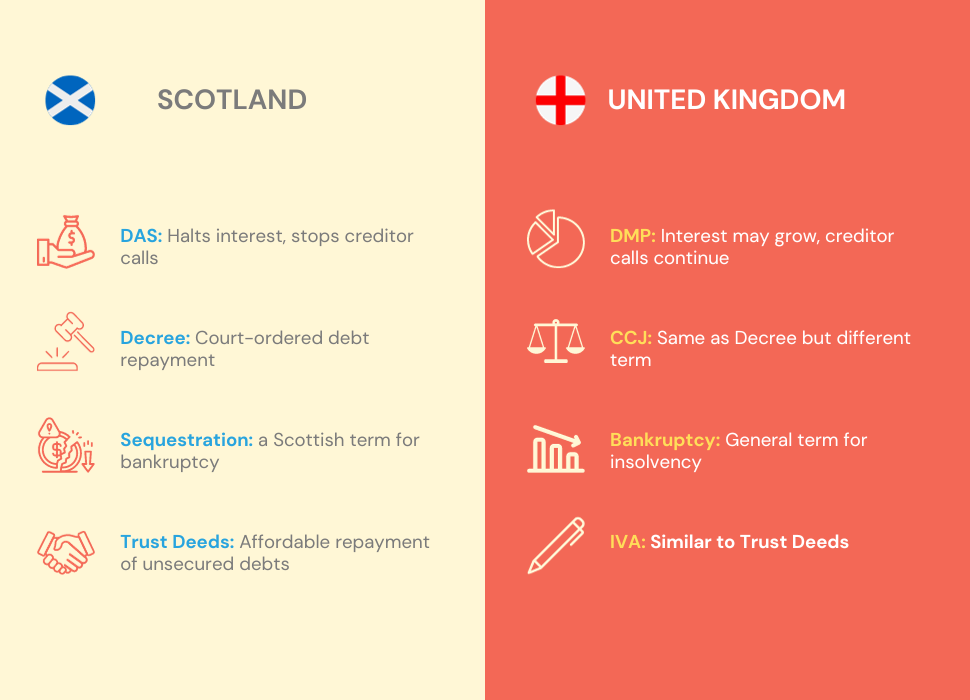- Can You Get a Mortgage in Scotland with Bad Credit?
- Understanding Your Credit Situation: Why It Matters
- Getting a Bad Credit Mortgage in Scotland
- Differences between Scotland and the UK Financial System
- Lenders for Bad – Credit Mortgages in Scotland
- Does Location Matter When Choosing a Mortgage Broker?
- Key Takeaways
- The Bottom Line
How To Secure Bad Credit Mortgages in Scotland?

If you’ve been battling with a less-than-perfect credit history and you’re living in Scotland, you might think that securing a mortgage is out of reach.
But here’s the good news – it’s not as impossible as you may believe.
There are options available, even with a history of bad credit, that could make your dream of home ownership a reality.
Our goal with this article is to guide you through those possibilities, dispel some common misconceptions, and offer practical advice to help you navigate the mortgage landscape in Scotland.
Can You Get a Mortgage in Scotland with Bad Credit?
Yes, you can. In Scotland, even if you have credit problems, you can still qualify for a mortgage.
This includes situations like having no credit history, a low credit score, late or missed payments, court judgments, or even having been declared bankrupt and now discharged.
But, it’s essential to understand that the path to securing a mortgage with bad credit may present some unique challenges:
- Limited Lender Choice. Not every lender will be willing to take a chance on someone with bad credit. This could limit your choices and make the process a bit more challenging.
- Higher Interest Rates. Typically, bad credit mortgages might come with higher interest rates, given the perceived risk involved for the lender.
- Larger Deposits. Lenders may require you to put down a larger deposit to offset the risk associated with your credit history.
- Impact of Specific Credit Issues. Your ability to get a mortgage may depend on the nature and severity of your credit issues. Some lenders might be more forgiving if your credit problems were due to life-altering events such as sickness or redundancy.
While these constraints may sound daunting, don’t be disheartened. There’s a silver lining here.
Various lenders specialise in offering mortgages to individuals with bad credit, and they take a more holistic approach, considering factors beyond just your credit score.
Remember, everyone’s circumstances are unique. While you may face some hurdles along the way, understanding your options and being knowledgeable can make all the difference.
Understanding Your Credit Situation: Why It Matters
It’s crucial to comprehend your credit situation. Because, let’s face it, not all bad credit is created equal.
From late payments to bankruptcy, different credit issues carry varying degrees of concern for lenders. So, let’s break down some common bad credit situations:
- Arrears. If you’ve had a few hiccups and slipped into arrears, don’t lose hope. Many Scottish lenders will consider your application despite mortgage arrears or arrears on unsecured debts. But, they generally prefer that you have had only one, two, or three months of mortgage arrears in the past 24 months.
- Debt Management Plans. These show lenders that you’ve had problems repaying your debts in the past. In Scotland, there are around 15 lenders who are open to applications if you’re presently in a debt management plan. Once you’ve paid off your plan, the number of willing lenders goes up to 35.
- Decrees. Known as county court judgements (CCJs) in other parts of the UK, decrees are court orders to repay a debt. Satisfied decrees are generally viewed more favourably than unsatisfied ones.
- Defaults. If your credit report shows satisfied defaults, nearly all Scottish lenders are prepared to look at your application. This figure drops by about half if the defaults are unsatisfied.
- Sequestration. This is the Scottish term for bankruptcy. The further you are from discharge, the more mortgage options you’ll have. If you’re just one year discharged, choices can be very limited.
- Trust Deeds. If you’re currently paying off a trust deed, your lender options will be limited. But, more lenders in Scotland will consider your application once you’ve successfully finished your payments.
Your credit issues don’t necessarily close all doors to a mortgage in Scotland. Understanding your credit situation in depth and how it interacts with the policies of various lenders is the first step in the right direction.
Getting a Bad Credit Mortgage in Scotland
Securing a mortgage with bad credit in Scotland may seem tough. But don’t worry, there’s help available.
Firstly, seek advice from a ‘bad credit broker‘. These friendly experts can guide you towards a home loan, even if your credit history has some bumps.
Our service connects you to the right broker for free, with just a quick online form. Here’s how they can help:
Sort Out Your Money Matters
It’s important to manage your debts. One way is through the Debt Arrangement Scheme (DAS), a plan unique to Scotland. Local debt advisors can explain this and other options to you, and help you apply once you decide.
Brokers can also help you create a monthly budget. This shows you can manage your money well and pay off debts, impressing lenders.
Get to Know Your Credit Report
Your broker will explain your credit score, showing you how past issues may affect it. They’ll also check your report is up to date.
Remember, if you’ve paid off debts recently, it may take time to show on your report. So, wait a bit before you apply for a mortgage.
If illness or job loss caused past money troubles, your report can include a special note. This gives lenders more context during a credit check.
Finally, remember some lenders in Scotland offer special options for people with bad credit. These might include flexible repayments, personalised advice, or even specific mortgage products just for you.
So, even with bad credit, don’t lose hope. With the right help and a clear plan, you can get your mortgage in Scotland. It’s more possible than you think!
Differences between Scotland and the UK Financial System
When discussing bad credit mortgages, knowing the difference in financial terms and solutions across the UK can be useful. Let’s take a look at some unique aspects of the Scottish system:
The Debt Arrangement Scheme (DAS)
The Scottish government runs a scheme called the Debt Arrangement Scheme (DAS). This plan allows people who owe money to repay it over time.
It’s Scotland’s alternative to the Debt Management Plan (DMP) available in the rest of the UK.
The DAS is often seen as a better choice because it stops interest from growing and prevents creditors from constantly phoning you.
Decrees and County Court Judgements (CCJ)
In Scotland, a court order to repay a debt is known as a ‘decree’.
But, in England and Wales, this is referred to as a County Court Judgement (CCJ). It’s just different names for the same thing – an official order to pay back what you owe.
Sequestration and Bankruptcy
What the Scots call ‘sequestration’ is known as ‘bankruptcy’ in England and Wales. This process of declaring insolvency is guided by the Insolvency (Scotland) Rules 1986.
Plans are in the pipeline to align these with the 2016 Insolvency Rules used in the rest of the UK.
Trust Deeds and Individual Voluntary Arrangements (IVA)
Scotland has something called a ‘trust deed’, also known as a Scottish IVA.
This is the equivalent of what’s known as an Individual Voluntary Arrangement (IVA) in the rest of the UK. Both are agreements to pay off unsecured debts at an affordable rate.
Remember, understanding these distinctions will help when dealing with lenders or brokers outside Scotland.
You’ll be able to talk confidently about your financial situation, making the process of securing a bad credit mortgage that much smoother.

Lenders for Bad – Credit Mortgages in Scotland
If you have bad credit, quite a few lenders in Scotland won’t shy away from your application. Specialist lenders like Norton Home Loans and Aldermore, or bigger players like HSBC, could be your path to a mortgage. The best fit for you hinges on your unique credit past.
A quick note if you’re living in the Scottish Isles or Highlands – some lenders might be picky about location.
Big names like Aldermore, Bluestone, Metro Bank, and Kensington Mortgages cater mainly to mainland Scotland. A few others might have a list of postcodes they avoid.
But, even with these restrictions, you’ve got options. Building societies and specialist lenders often have a more personal approach compared to the high street banks, and might be more understanding of your situation.
Does Location Matter When Choosing a Mortgage Broker?
When it comes to choosing a mortgage broker, their geographical location isn’t as important as their experience, knowledge, and network. Here’s why:
- Experience Matters. You’ll want to choose a broker who has plenty of experience with bad credit mortgages and understands the intricacies of Scotland’s distinct financial landscape.
- Wide Network. A broker with a broad network can access a variety of lenders, including those who cater specifically to individuals with bad credit. This increases the chances of finding a mortgage that fits your needs.
- Technology-Driven. Today’s digital world makes it possible to work with brokers from anywhere. You can have virtual meetings, sign documents electronically, and access a wider range of options.
That said, a local Scottish broker might have a deeper understanding of the local market and could provide tailored advice that fits your situation.
In the end, your choice will depend on your personal preferences and circumstances.
Key Takeaways
- Bad credit doesn’t mean you can’t get a mortgage in Scotland. Various lenders, including specialist ones, building societies, and even some high street banks, might consider your application.
- Understanding your credit situation and knowing how different bad credit situations affect your mortgage options is key.
- A bad credit mortgage broker can be an asset. Their knowledge and experience can help you navigate the complex financial landscape.
- Your credit report holds great importance. Understanding it allows you to identify areas that need improvement.
The Bottom Line
Whether local or not, the right broker understands your needs, has a broad network, and is well-versed in Scotland’s financial systems.
Moving forward, the next step in your journey towards home ownership is to connect with a mortgage broker who understands the Scottish market.
Their advice can help guide you to lenders who look beyond the numbers and consider your circumstances.
To take advantage of this, reach out to us today. We’ll link you to a seasoned broker who can help you get bad credit mortgages in Scotland.
Get Matched With Your Dream Mortgage Advisor...

Frequently asked questions
Is it easier to get a bad credit mortgage in Scotland?
The ease of securing a bad credit mortgage isn’t really about location – it’s about individual circumstances. Scotland, like the rest of the UK, has lenders who specialise in bad credit mortgages. It’s about finding the right one for your situation.
How long does it take to get a bad credit mortgage approved in Scotland?
Typically, getting a mortgage approved could take anywhere from 18 to 40 days, sometimes more. This can vary based on your circumstances and the lender’s process.
With bad credit, it might take a tad longer as lenders will likely want to scrutinise your application more closely. Your broker can help speed things up by ensuring everything is in order.
This article has been fact checked
This article was created, checked, and verified by the expert team at Money Saving Guru. Trust us, you’re in good hands.




